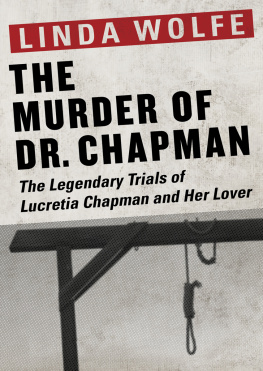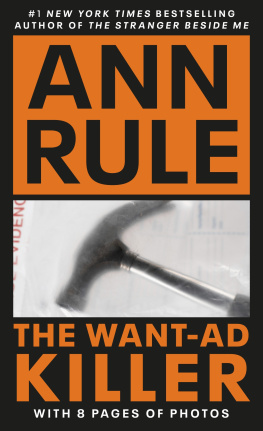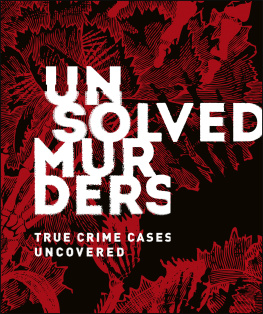Love Me to Death
A Journalists Memoir of the Hunt for Her Friends Killer
Linda Wolfe

For M.P.
The manifold labyrinth my steps
wove through all these years since childhood
has brought me to this ruinous afternoon.
Jorge Luis Borges
Conjectural Poem
A UTHORS N OTE
T he information in this book comes from the interviews I conducted with scores of people involved with Ricardo Caputo or his victims, as well as from police and court documents and newspaper articles. The narrative accounts of what transpired between Caputo and individuals now dead, including material in direct quotation, are drawn from the investigations conducted by the police with associates of the dead individuals, except in one or two instances where, because no other information was available, I made use of information tendered to me by Caputo that I judged to be true.
All the names used in the book are actual, except for those of the woman Caputo attempted to rape in 1975, the woman who kept a diary about him in 1982 and 1983, and the woman who had an affair with him in Mexico City in 1977, who are referred to here as Mary ONeill, Lotte Angstrom, and Maria Lopez, respectively.
P ROLOGUE
N ot long ago a man who had been on the run for twenty years, altering his appearance, buying new birth certificates, commandeering new social security numbers, moving from one impersonal American city to another, and slipping back and forth across the countrys easy borders, confessed to having murdered several women with whom hed had lengthy love affairs and voluntarily turned himself in for the killings. The women had all been attractive, accomplished, intelligentone had worked for a bank, another had been a psychologist, another a film editor, another a graduate student at a university. Theyd met the murderer through their work or while relaxing at cafes or bars, and hed pleased them with his handsome looks, friendly smile, and artistic talent, as well as with the amusing stories he told about the good life hed led as a boy in Latin America. Theyd also felt sorry for him, for that good life had ended for him once he came to the United States, or so he said. Here, hed become just another Latino, a victim of prejudice and restrictive visas, whod had to hide from immigration authorities and take low-visibility and low-end jobs, work that was far beneath his abilities. The women were touched by his travails and enthralled by his charms. They dated him, took him home and to bed with them, introduced him to their friends and their parents, and had no idea that what lay in store for them when they decided to end their relationship with him was a knife in the chest, a nylon stocking tied around the throat, a brutal and fatal beating.
The murderer went by many names during his years on the lam, seventeen names in all. But his real name was Ricardo Caputo.
P ART O NE
T HE W OMEN
I remember clearly the dayit was over a dozen years agothat I first heard the name Ricardo Caputo. The person who mentioned the name to me was a private detective whod been hired to find out who had murdered a New York writer, a woman noted for philanthropy and social activism. The detective had been on the case for a year and a half, and on a February afternoon in 1985 he informed me that he at last knew the killer. It was Caputo.
I remember how relieved I was to hear the name. It didnt mean anything to meany name would have done. And the feeling of relief didnt last long. In a few minutes, it would dissipate, then vanish altogether. But before I get to that, let me explain why I was at least momentarily relieved. It was because Id known and admired Jacqui Bernard, the dead woman, and had long been hoping that the mystery of her death would be solved.
Id even tried to solve it myself. Amateur sleuth that I was, after Jacqui was killed in the summer of 1983, I spent weeks interviewing people who might be able to shed light on her murder and published my findings, such as they were, in an article in New York magazine. At the time, I was relatively new to crime reporting. I was also shy, not the kind of person to whom asking questions of strangers came easily. Still, I managed to turn out a fairly decent piece of work about Jacqui, and because of this Id gotten to know McEwan. Hed looked me up after my article appeared and wed become friends of a sort. Phone pals, mostly, though occasionally we got together for a talk, a meal.
I enjoyed knowing him. Writing about Jacqui, Id become obsessed with discovering who had killed her, and McEwan shared that obsession. Our reasons were different. He was on a job. I was just intensely curious. I think it was because Jacquis murder had spoken to a particular fear of mineand, I believe, of many women. Shed been killed not by a stranger but by someone she knew, someone who hadnt had to sneak into her home or force his way into her room. She had let her killer in. Or come home with him. She had been killed by an intimate.
I hadnt known this at first, and neither had the police. Indeed, at first they hadnt even believed that Jacqui had been murdered. Her body had been found by her sister and brother-in-law, whod been expecting her for dinner. When she failed to show up, they went to her apartment to see if anything was wrong. They got a key from a member of the co-op board, let themselves in, and saw Jacqui lying facedown on her bed, her head leaning against a small velvet pillow. She didnt stir, and they realized she was dead.
Nothing suggested foul play. When the police arrived at the spacious co-op, they observed that it hadnt been broken intonot just the door but all the window locks were still intact. They noted, too, that the rooms showed no signs of disarray. No drawers had been dumped, no closets ransacked, and the bed on which the dead woman lay wasnt rumpled or disturbed. The only odd thing was that she was wearing a long-sleeved bathrobeodd because it was an exceedingly hot night and her apartment had no air-conditioning. But strokes and cardiac arrests werent altogether uncommon in women of Jacquis age, which was sixty-two. Maybe, the police reasoned, shed put on the robe because a sudden chill had presaged an incipient heart attack or stroke.
This view was shared by the medical examiner the police summoned to look over the body. The ME pronounced that Jacqui had died of natural causes.
But of what sort of natural cause? Jacquis sister wanted to know if shed been sick or had a coronary, and she asked to have an autopsy performed. The body was taken to the medical examiners office, and one of the doctors there undertook the slow, careful examination of every inch of flesh and expanse of inner organ. Not long after this second medical examiner began his autopsy, he noticed something the original ME had not. Jacquis larynx had been fractured. She had been strangled to death by someone with strong, deadly fingers.
It was at this point that Gordon McEwan had entered the picture. Having lost confidence in the police, Jacquis sister had enlisted him to look into what had happened to her. He and his partner had gone to her apartment, searched the rooms, and found something, a cluea yellow towel or bedspread, a close friend of Jacquis told methough exactly what the clue was and what its significance might be, I certainly didnt know. Not when I wrote my article. At that time, given that the cause of her death was a mystery and few facts about it were at my disposal, I wrote as much about Jacquis life as about her death.














